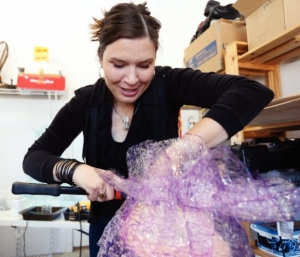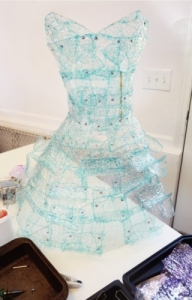'Fashion' statement
By Kirsten Ballard
Published in News on May 4, 2015 1:46 PM

News-Argus/MELISSA KEY
Diala Estela uses rivets to attach plastic bottles that have been shrunk and colored to her dress sculptures. She recycles water bottles used by military families to help portray her vision of the invisible dress representing the life of a military spouse.

News-Argus/MELISSA KEY
The first "Marry Me" dress that Diala Estela created out of plastic bottles won third place in a household objects art contest at the Visual Art Exchange in Raleigh.
Some liken it to something Lady Gaga would wear on a red carpet.
Others simply praise its beauty.
But "Marry Me," a piece of art that saw pieces of plastic bottles combined to form a light blue, 1950s-style dress, means more to Diala Estela than those who have seen it on display at the Visual Art Exchange in Raleigh could ever know.
In a way, it represents the artist, herself -- a woman who describes her roles as mother, military spouse and mentor as a patchwork identity of sorts.
And it also contains the spirit of those who provided the materials -- the plastic collected at Seymour Johnson Air Force Base's Airman and Family Readiness Center.
"Beautiful people drank from these," she said.
Mrs. Estela's latest art collection sees her piece together recycled bottles into dresses as a representation of military spouses.
The sculptures are made from plastic bottles that have been hand cut, died, shrunk and riveted together to make a dress form -- bottles that were consumed by military wives, husbands and children.
"Beautiful people drank from these," she says.
"Marry Me" took 135 bottles to create and won third place in the "Common Goods" art show at the Visual Art Exchange.
But the award matters little when compared to sacrifices made by those -- including Diala -- it represents.
"It's my journey," she said. "It's a female identity for myself, thinking of mending all these issues together."
Diala has been married 11 years -- and in that time has moved, with her husband, from New Jersey to Wyoming to Germany to Goldsboro.
But the moves, she said, were not a bad thing.
"I chose this," she said, adding that she and her husband were married when he was a second lieutenant in the Air Force.
As she began creating the dress, Diala rediscovered herself as an artist. She's always been active in creating, but now is working on redefining herself as a professional artist.
With her experience in art therapy in juvenile detention centers, Diala gravitates toward cheaper materials. Funds were limited for the center, and still are, as she creates large-scale sculptures out of pocket.
For two moves, she has begun collecting plastic bottles only to have to discard them before moving.
"I decided this was my year that I was going to be an artist," she said.
This meant getting current in art shows. She read the qualifications of the "Common Goods" show and frantically began piecing together the bottle scraps.
Her husband told her not to worry, she could always enter another art show.
"I said 'No, I am tired of waiting to do this, waiting for another art show. When is it that I'm ever going to be an artist?' I put things behind me all the time," she said. "That's what military spouses do. We lose ourselves because we're waiting for the next move to come."
She finished the dress three days before the application period ended.
She posted the process on her Facebook page and was praised by friends and family who shared the photo.
"They liked the dress, they didn't know the meaning of it. The meaning is so much more profound," she said. "It is aesthetically beautiful, but the bottles are even more beautiful because it represents someone like you or me."
The plastic is durable and strong, symbolic of the women it represents.
"I could throw this across the room," she said. "It will not break."
She is working on the second dress of the series. It is a ruffled lavender cocktail dress with a pencil skirt. Diala wants it to represent the functions that military spouses go to, and never know what to wear.
"No matter what rank, you don't know what to wear to events," Diala said, laughing.
Through her time as a military spouse, she has learned the importance -- and definition -- of resilience. She tries to teach her mentees in the key spouse program how to become unbreakable.
"We're kind of see through," she says, which is why she made the dresses transparent. "We're trying to find our ... identities. We live through our active duty spouse's last name and Social Security number. That's a big deal for some people. I was trying to live as an art therapist, raise kids, trying to get my career together and not getting myself together because we're moving all the time."
To her, being a military spouse is just one part of her identity.
"Our husbands or wives leave and we're here," she said. "We're mending all the pieces."
Children get sick, things break, and it is an emotional rollercoaster, she says.
And to makes things worse, military spouses are away from their family and dealing with everyday problems alone.
Diala does not think they give themselves enough credit.
"We're so caught up that we forget to breathe and remember, 'I have a life, too.' That's the whole thing about the shingling," she said. "It's the mending."
By creating the dresses and speaking with other spouses, she realized she was not alone.
"We're focused on our troops, and we need to," she says. "They're the person that makes it happen, but we're the people that keep the family together."
